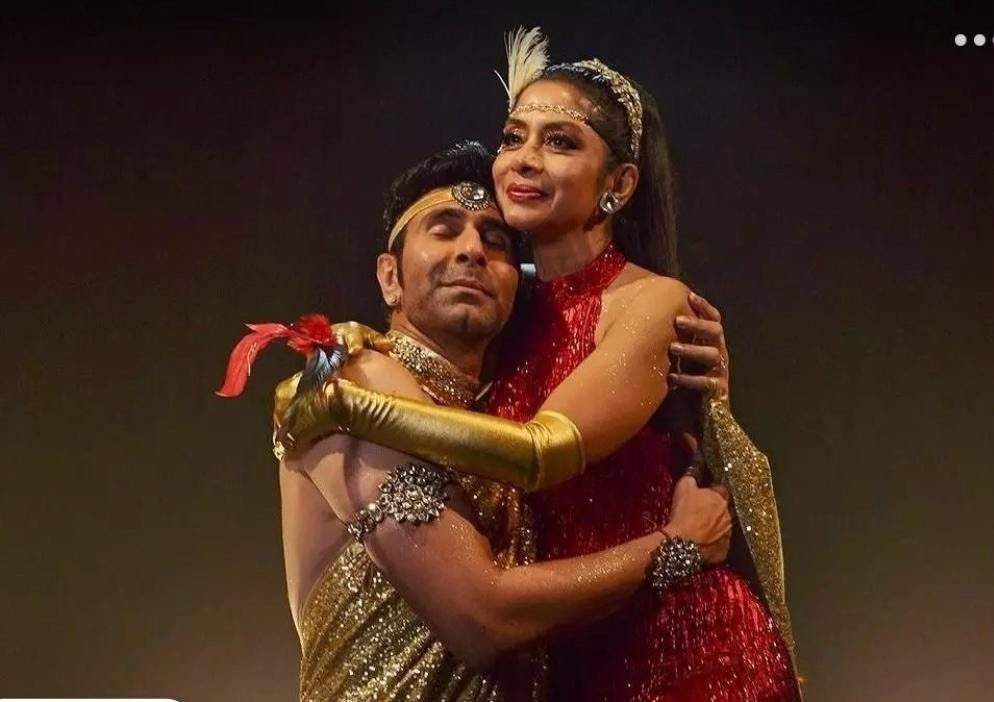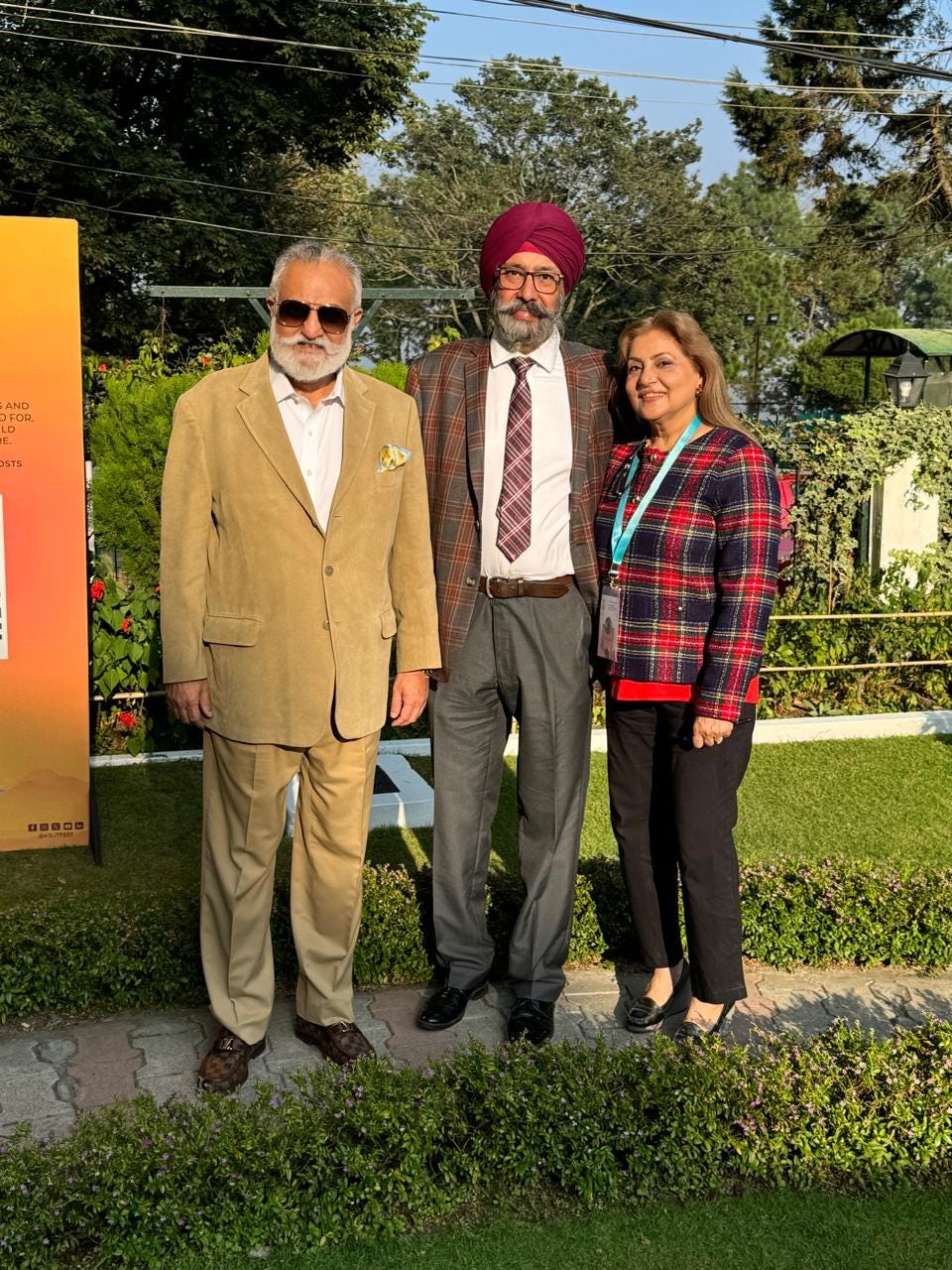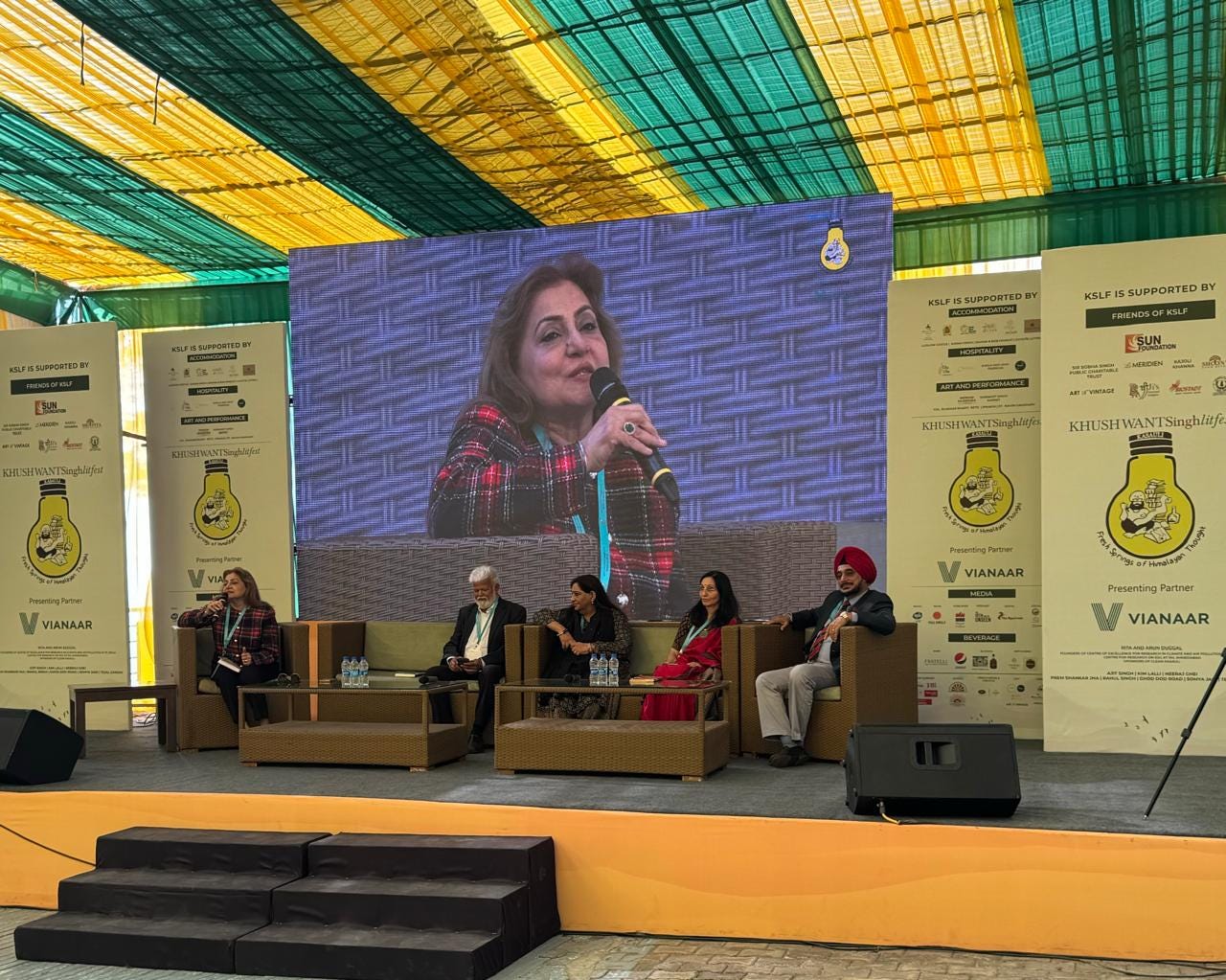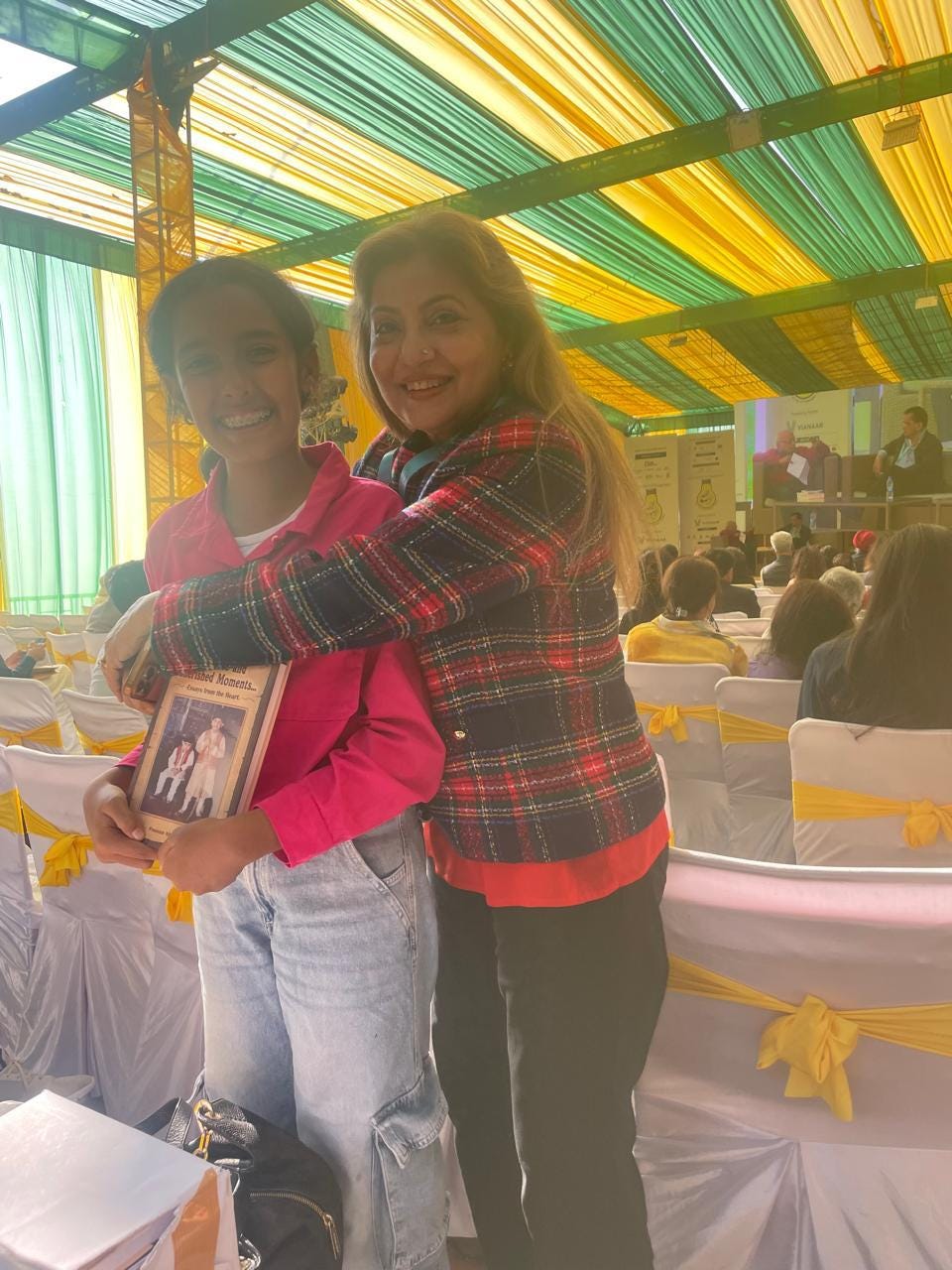"Who Killed the Khushwant Singh Literary Festival at Kasauli?"
The appearance of Indrani Mukerjea, the former entrepreneur-cum-socialite now out on bail as the accused in the murder of her daughter Sheena Bora, on the festival stage has stirred a controversy.
The Closing of a Festival and a Sudden Distraction
We found ourselves on the final day of the Khushwant Singh Literary Festival, held at the historic Kasauli Club, nestled in the serene hills. The Sunday afternoon session— the concluding day of the 3-day KSLitFest— also featured the launch of Chuckles and Cherished Moments, a new book by my wife, Poonam Khaira Sidhu, who has been a long-standing participant in this literary event. Her session was an unqualified success, and after her presentation, she was surrounded by fans and admirers eager to get her autograph on the book they had just purchased.
Despite the allure of the festival’s grand finale—a professional enactment of Khwaja Ahmed Abbas' profound play, Who Killed India?, based on his quintessential question about the Partition of India—we had to return to Chandigarh due to pressing commitments. We were told this climactic event had been chosen with special care, as it was a theme much admired by Khushwant Singh, who had arguably shot into fame with the publication of his first novel, Train to Pakistan.
However, this morning’s headlines weren’t about the festival’s closing act or the play's powerful message but rather something far more sensational—Indrani Mukerjea’s unexpected appearance as a participant in the festival’s climactic event.

A Divisive Appearance: Indrani Mukerjea on Stage
The news was startling: Indrani Mukerjea, the infamous murder-accused, out on bail, had taken participated in the festival's closing event. Social media erupted. While some people were scandalised that a person accused of murdering her own daughter had graced the stage at a festival dedicated to the memory of one of India's greatest writers, others drew sharp comparisons to the double standards seen during the #MeToo movement.
One prominent voice in this debate was that of Deepika Narayan Bhardwaj, a public figure who has dedicated her career to exposing cases of false accusations and extortion through rape charges. In a fiery tweet, she wrote:
"Why are people upset? She’s a woman, has taken half her ex-husband's property, and is only accused of murdering her daughter. She should be allowed to have all these parties. Shame is only for men accused of #MeToo. That’s why I don’t see the feminist brigade campaigning against her, even though the victim here was also a woman."
The tweet resonated widely, igniting a debate on whether there was a double standard at play. Why was there no public outcry, as there had been for men accused in the #MeToo movement, many of whom had been ostracised from public life without concrete evidence?
Indrani Mukerjea and Khushwant Singh: A Provocative Parallel?
As I reflected on the controversy, it struck me that Khushwant Singh, the man in whose honour the festival is held, would likely have revelled in this spectacle. Khushwant Singh was no stranger to controversy, and he loved to provoke thought and debate. This literary festival, after all, bears his name, and perhaps this event aligns with the very spirit of controversy that defined his work and public persona.
But does this justify the decision to include Indrani Mukerjea, a murder-accused, in the festival’s crowning performance? This question invites multiple perspectives. Legally, Mukerjea remains innocent until proven guilty, and even a convict retains fundamental rights in a just society. In her case, she has not been convicted, despite the intense scrutiny from the media and her former colleagues. Her resilience in navigating years of legal and personal adversity is undeniable.
However, the moral and symbolic implications of featuring her at such a prestigious event, particularly one honouring a figure like Khushwant Singh, are more complex. While some may argue that the festival should uphold artistic freedom and inclusivity, others may feel that her presence detracts from the festival’s intended purpose of celebrating intellectual and cultural integrity. Ultimately, the decision reflects the difficult balance between legal rights, public perception, and the symbolic weight of the event.
The Sheena Bora Murder Case: A Recap
Indrani Mukerjea rose to infamy for her alleged involvement in the 2012 disappearance and murder of her daughter, Sheena Bora. The shocking details of the case only came to light in 2015 when her driver, Shyamvar Rai, was arrested and allegedly confessed to helping carry out the crime. Indrani, alongside her ex-husband Sanjeev Khanna and her then-husband Peter Mukerjea, was implicated in the gruesome act. The Central Bureau of Investigation (CBI) accused Indrani of orchestrating the murder, citing personal and financial conflicts as potential motives. One of the key reasons suggested by the CBI was Indrani's strong disapproval of Sheena’s relationship with Rahul Mukerjea, Peter’s son from a previous marriage.
Indrani, however, has consistently maintained her innocence, claiming that Sheena is still alive and living in Kashmir—a defence that investigators have dismissed as implausible. After nearly seven years in custody, the Supreme Court granted her bail on May 18, 2022, citing the extended period of incarceration and the likelihood that the trial would not conclude anytime soon. The court observed that even if the prosecution dropped 50% of its witnesses, the trial would still face significant delays. As of now, her trial remains ongoing.
The Netflix Factor: Reigniting Public Interest
In 2024, Netflix released The Indrani Mukerjea Story: Buried Truth, a documentary that revisits the Sheena Bora murder case. The release of the series was not without controversy, as the CBI had petitioned to delay its launch, fearing it could influence the ongoing trial. However, the Bombay High Court cleared the documentary’s release, finding that it contained no prejudicial content that hadn’t already been made public through other media (official trailer).
The documentary presents Indrani’s version of events, sparking fresh interest and debate about her guilt or innocence. For some, the documentary further complicates public perception of Mukerjea—casting her either as a resilient woman battling media and legal adversity or as a manipulative figure shaping her narrative to escape justice.
Conclusion: Who Killed the Khushwant Singh Literary Festival?
So, who really "killed" the Khushwant Singh Literary Festival at Kasauli? Was it Indrani Mukerjea’s controversial participation, or the organisers’ decision to feature her in such a prestigious setting? It’s easy to cast blame on Indrani for "stealing the spotlight" with her notorious reputation, but many would argue that the organisers are ultimately responsible for the decision to allow her on stage. After all, the festival is meant to honour the life and works of Khushwant Singh, a literary icon who celebrated free thought, dissent, and lively debate. Ironically, Singh himself might have appreciated the controversy for the way it stirred public discourse—true to the spirit of the man.
However, it's important to recognise that this episode, while sensational, is but a minor blip in the festival's long and successful journey. The Khushwant Singh Literary Festival remains alive and vibrant, having completed its 13th edition, with even a London version now in the mix. This festival, set far from the hustle and bustle of Mumbai and Delhi, continues to offer a unique space for launching new authors and hosting diverse personalities.
We must applaud Rahul Singh, Khushwant Singh’s son and the driving force behind this initiative, along with his partner Niloufer Bilimoria, for their remarkable achievement in creating and sustaining this festival. In an era where books and book lovers are often considered a dying breed, they have kept the flame alive—without any government support. Their commitment to celebrating literature in an authentic and meaningful way is truly commendable, and we should view the Indrani Mukerjea episode as a fleeting controversy in an otherwise noble endeavour.







